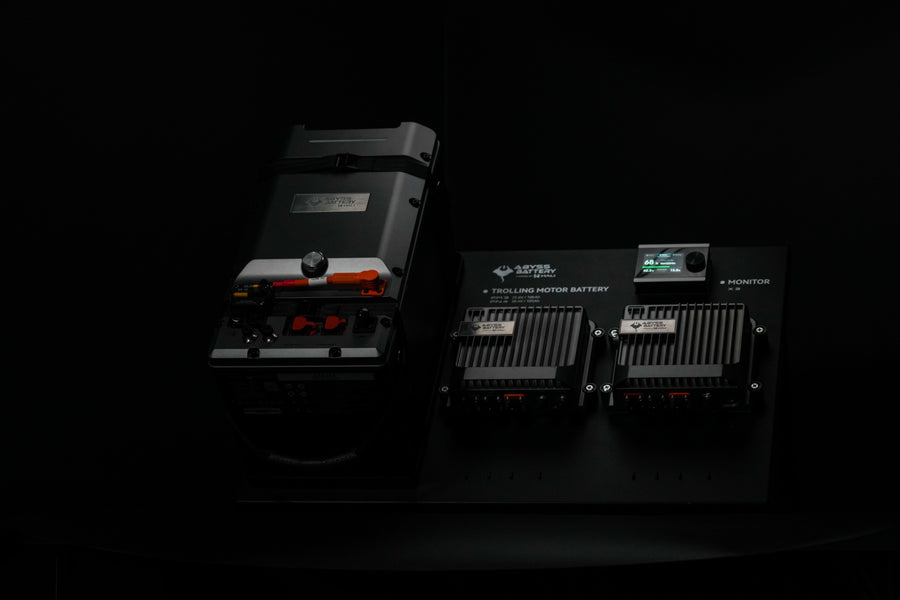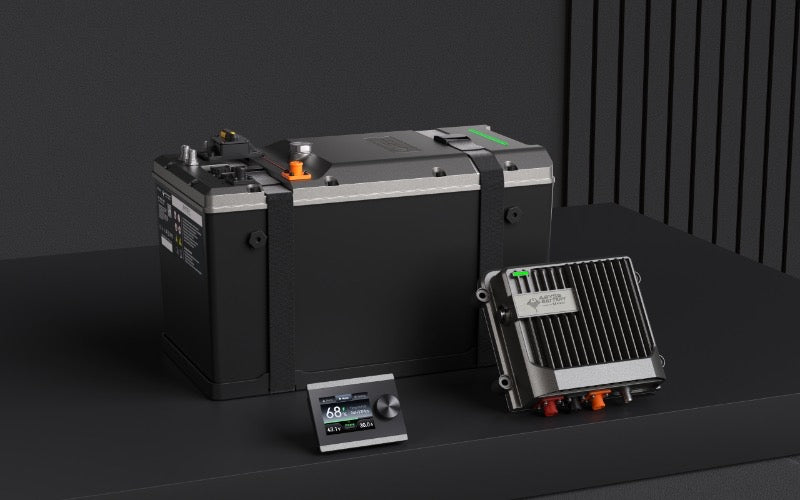Install Your Marine Dual Battery Setup

Heading out on the water requires more than just a boat and good weather; a reliable power source is a must. A marine dual battery setup is your safety net, ensuring that even if one battery fails, you're not left stranded. We're going to explore the essentials of these systems, from understanding their importance to picking the right batteries. Let's get your boat powered up and ready for uninterrupted marine adventures.
Understanding Marine Dual Battery Systems
A marine dual battery setup is like having a backup generator for your boat. It's two batteries working together to make sure you have power when you need it most. Here's why it's a significant advantage for boating:
- Non-stop Power: With two batteries, one can be dedicated to starting the engine, while the other runs your electronics. This means your fish finder, lights, and radio keep going even if the starter battery is low.
- Safety: If one battery dies, the second is there to save the day, getting you back to shore safely.
- Longevity: By sharing the electrical load, each battery lasts longer, saving you money and hassle in the long run.
- Better Performance: High-demand electronics get the stable power they need, which means better performance from your gear.
Experts like BoatUS agree that a dual battery system is a smart choice. According to credible sources like BoatUS, it's one of the top recommendations for boaters looking to enhance their electrical systems.
Choosing the Right Batteries for Your Boat
When it comes to powering your marine adventures, selecting the right batteries is crucial. The right choice ensures you have a reliable power source to meet your boating needs. Here's what to consider when picking batteries for your dual battery setup:
- Battery Type: Marine batteries come in various types, including starting, deep cycle, and dual-purpose. Starting batteries kick off the engine, deep cycle batteries power electronics, and dual-purpose batteries do both.
- Capacity: Look at the amp-hour (Ah) rating to determine how much energy the battery can store and deliver over time.
- Size and Power Needs: Match the battery size to your boat's power requirements. Larger boats with more electronics will need batteries with higher capacity.
Compare the options and choose a battery that aligns with your boat's size and your power needs. For a more in-depth understanding, check out credible sources like Discover Boating.
Installing and Wiring Your Dual Battery Setup
Correct installation and wiring are essential to a safe and functional dual battery system. Here's a step-by-step guide to help you:
- Plan Your Layout: Decide where to place your batteries and how they'll connect to the boat's electrical system.
- Gather Materials: You'll need batteries, cables, a switch, and tools for installation.
- Follow Safety Precautions: Always disconnect the power before starting and wear protective gear.
- Mount Batteries: Securely install the batteries in a location that's dry and ventilated.
- Wire the System: Connect the batteries to the switch and the boat's electrical system, respecting the polarity.
- Test Your Setup: Once everything is connected, test the system to ensure it's working properly.
For visual aids and more detailed instructions, refer to simple diagrams or resources like BoatUS. Remember, if you're not confident in your ability to safely install the system, it's best to consult a professional.
Maintenance and Troubleshooting for Dual Battery Systems
Keeping your marine dual battery system in top shape is key to ensuring reliability on the water. Regular maintenance can prevent common issues and extend the life of your setup. Here's how to keep your system running smoothly:
- Regular Checks: Regularly check your batteries for any wear, rust, or loose wires.
- Cleaning: Keep the battery terminals clean. Use a mixture of baking soda and water to clean off any acid and prevent corrosion.
- System Upkeep: Ensure all cables and connections are tight and secure. Check the water levels in lead-acid batteries and top up with distilled water if needed.
If you encounter problems with your dual battery system, here are some common issues and their solutions:
- Battery won't hold a charge: This could be due to age, damage, or a deep discharge. Test the battery with a voltmeter and replace it if necessary.
- Electrical issues: Flickering lights or power loss could indicate a wiring problem. Double-check all connections and replace any damaged wires.
- Charging problems: If one battery charges more than the other, you may need to check the isolator or combiner for issues.
If these steps don't solve the problem, it's time to seek professional help. A qualified technician can diagnose and fix complex electrical issues safely.
Upgrading Your Marine Dual Battery System
To get the most out of your marine adventures, consider upgrading your dual battery system with advanced accessories:
- Battery Isolators: These ensure that your starting battery is always charged, allowing your auxiliary battery to power other devices without draining the starter.
- Battery Monitors: Keep track of your batteries' charge and health with a monitor, so you're never caught off guard by a low battery.
These upgrades can greatly improve how well your system works and how reliable it is:
- They allow for better power management, ensuring you have enough juice for both starting your engine and running onboard electronics.
- They provide peace of mind, so you can focus on enjoying your time on the water.
When you're ready to take the next step in power management, Abyss Battery offers high-quality marine batteries and accessories to maximize your boating experience.
Conclusion: Maximizing Your Marine Adventures
A reliable marine dual battery setup is the heart of your boating experience. Putting money into a properly installed and looked after system means you can enjoy your time without fretting over power problems. Remember:
- Regular maintenance is key to system longevity.
- Quality equipment translates to reliable performance.
- Upgrades can offer better power management and peace of mind.
For those ready to take the next step, visit www.abyssbattery.com to explore a selection of high-quality marine batteries that can help you get the most out of your time on the water.




Educative and enriching article
Leave a comment